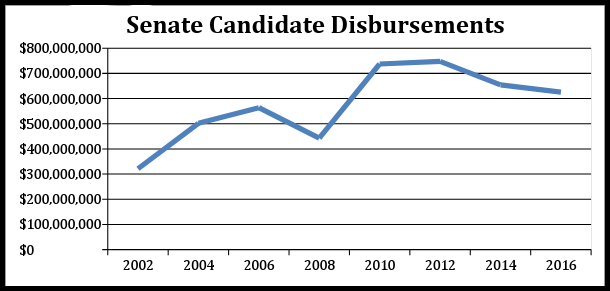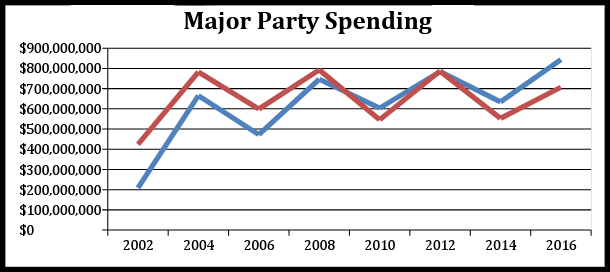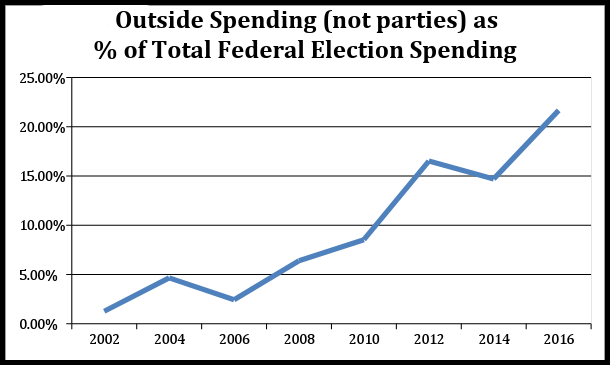On the 21st of January in 2010, the US Supreme Court gave a ruling in the Citizens United vs FEC case. It was a landmark decision that turned their politics upside down. It was legal, the court ruled, for a company or an organisation to spend money on behalf of a candidate they liked, as an extension of the Freedom of Expression. So if, say, Warren Buffet liked some John Cornyn, he could spend close to $32k on behalf of his campaign, as long as he didn’t technically co-ordinate with the candidate himself.
The consequences were either exciting or disastrous depending on which side you lean on. Barack Obama said in a State of the Union address it would ‘open the floodgates for special interests’.
And I suspect he was right.
Here’s a nice graph showing the amounts candidates for Senate (for example) have spent, over the years.

And here’s another helpful little graph showing the amounts each of their two parties have spent:

In case you missed it, they’ve both gone up, but not by much.
And now, here’s a graph of campaign contributions made by outsiders: (TA-DA!)

If you’re thinking “Eh, what’s that got to do with me? Where’s the chips?” and are about to resume stalking the Victoria’s Secret account on Instagram, wait. There’s something interesting in here somewhere, I promise.
When you have all this money flowing into politics, it not only affects politicians and their policy positions, as this study showed, but it also affects citizens’ distrust of their government. For example, if Hillary Clinton has accepted hundreds of thousands of dollars from Wall Street banks, can you trust her to effectively regulate them?
But if you’re thinking it’s direct quid pro quo (as in I scratch your back and you scratch mine without thinking about how creepy that sounds), it’s not that obvious. Nobody’s going to accept a donation from someone and start making laws for them the next day.
The real impact is much more subtle. As Obama wrote in ‘The Audacity of Hope’ (2006),
…(you realise that) you haven’t changed Washington, and you’ve made a lot of people unhappy with difficult votes. The path of least resistance — of fund-raisers organized by the special interests, the corporate PACs, and the top lobbying shops — starts to look awfully tempting, and if the opinions of these insiders don’t quite jibe with those you once held, you learn to rationalize the changes as a matter of realism, of compromise, of learning the ropes. The problems of ordinary people, the voices of the Rust Belt town or the dwindling heartland, become a distant echo rather than a palpable reality..
The whole quote is candid and thoughtful, and you can read it here.
His competitor in 2008, John McCain, said something similar.
I do not believe that any of us privileged enough to serve in this body would everautomatically do the bidding of those who give. I do not believe that contributions are corrupting in that manner. But I do believe they buy access… that all of us, including myself, have been affected by this system.
Conflicts of interest are everywhere. There’s a conflict of interest when politicians are paid by the very companies they’re supposed to regulate. There’s a conflict of interest when doctors are given gifts by pharma companies. There’s a conflict of interest when a member of the selection committee is the father of a mediocre all-rounder we once toured England with.
So how do you deal with them?
In short, we either trust a biased source too much or not at all.
India currently has no major legislation about conflicts of interest.
Members of the Rajya Sabha are supposed to to maintain a ‘Register of Interest’ where they disclose their conflicts of interest. They do not have to disclose interests of their family members. There are no penalties for wrong or incomplete disclosure.
Members of the Lok Sabha do not have to maintain any such register.
In the 15th Lok Sabha, 128 of the 543 members came from the business class.
In 2014, the Delhi HC indicted both the BJP and Congress as guilty of accepting foreign donations in violation of a foreign contribution act. While that was being appealed, the Finance Bill of 2016 amended the definition of ‘foreign sources’ in the FCRA bill of 2010 to retroactively let them off the hook. It was pointed out that they were still in violation of a law from 1976.
Notes
1. Fine. If none of this really interested you…
You’re welcome.
2. Here is a good resource if you want to find out more about the state of Indian politics on conflicts of interest.
3. The foreign funding story was reported in The Wire.
4. US campaign finance graphs taken from this article, CC-by-SA 3.0
5. If you’re actually interested in how the moral licensing effect works, this is the really fun experiment I’ve written about up there.

